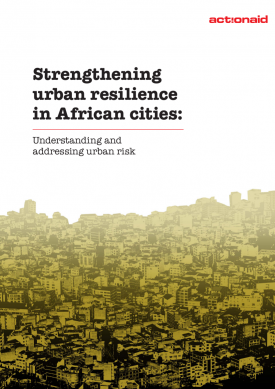Resource information
Author: Robyn Pharoah/ActionAid
The population of Africa’s cities is growing rapidly. But as poor people cram into towns and cities characterised by limited, weak and often under-resourced infrastructure, they are increasingly relegated to marginal, inadequately serviced, informal settlements and low-cost housing areas, leaving them vulnerable to numerous livelihood, health and security risks.
The impact of disasters, conflict and climate change is most severe for poor households, especially groups such as poor women and children, as they have the least access to resources to mitigate and recover from disasters. Disasters undo progress in achieving developmental goals, such as gains in education, healthcare and economic progress, and prevent vulnerable women, men and children from being able to claim their rights to basic needs such as food, shelter, work and healthcare. They also erode individual and household resources, undermining livelihoods and the realisation of human rights, which in turn increases vulnerability to disasters of all magnitudes. Climate change is compounding existing risks and creating new ones, placing additional pressure on urban poor people.
As part of its programme on strengthening urban resilience in African cities, ActionAid commissioned research to better understand the risks faced by urban poor people on the African continent. This exploratory research comprised a desktop review of the literature on urban risk in Africa, and fieldwork in three cities in Senegal, The Gambia and Zimbabwe. It examined hazards, vulnerabilities, local capacities, power imbalances and underlying risk drivers to identify strategies for enhancing resilience to disasters, climate change and conflict in Africa’s urban environments.

